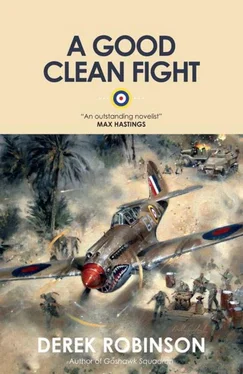“Don’t know,” Dunn said. “Doesn’t matter, does it?”
“Correct. Doesn’t matter a toss. Not a tiny toss.” They looked at each other and laughed with the suddenness of broken tension. The chase was over, Jerry had won, it was all a joke. Jolly funny joke. Davis’s jeep and Waterman’s wireless truck arrived while they were still laughing. Corporal Pocock was sitting on top of the truck. “Captain!” Pocock shouted. “That sodding Storch is down again.”
Lampard scrambled up beside him. Far off, beyond a patch of scrub, half a wing could be seen sticking out. The ground where the plane had landed fell away in a slight depression and this had hidden it from view unless you were Pocock, up high. “Brilliant!” Lampard said, and jumped down.
He couldn’t wait for the Alfa. He called the rest of the patrol around him for orders. “Stroke of luck,” he said. “Whatever’s wrong with that shufti-kite is getting worse. I shall go back in the jeep and try to find a way around the salt marsh. Mike, you follow. The rest wait here. Any questions?”
Sergeant Davis said: “There’s Eye-ties in those trees, you know.”
“What makes you think so?”
“Flies.” Davis waved an arm through the buzzing black aura. “Smell the garlic on their breath.” He was not happy.
“Why hasn’t someone come out to help those idiots in the plane?”
“Dunno.”
Lampard looked through his binoculars at the stretch of palms, but it was only a gesture, and they all knew it. “It’ll take us three minutes, maximum,” he said. “I’ve never known an Italian who could put his pants on in less than three minutes.”
Gibbon arrived in the Alfa as Lampard and Dunn left. “What’s the score?” he asked; and when Waterman explained, Gibbon merely sniffed. “Not impressed?” Waterman said.
“We should be on the trail, not on the spree.”
“It’s only three minutes, Corky.”
“What if it takes longer?”
“Then we’ve got time for a brew-up.”
Gibbon turned away and tried to find some shade. Waterman climbed onto his wireless truck and settled down to watch the attack. Trooper Smedley sat beside him. “If you ask me, this is plain bloody silly,” Smedley said.
“Ours not to reason why.”
“First we go to all that trouble to try to sneak through the Gap, then we go chasing butterflies till we’re nearly in Jalo. What’s so special?”
“You know what he’s like when he gets his teeth into something,” Waterman said. “British bulldog.”
“I had a mate had a bulldog,” Smedley said. “Ugly as sin. Dog wasn’t much to look at, neither.”
Schramm leaned forward and tried to see what the pilot was doing to the engine. Waste of time asking: he got no answer except metallic clinks and thumps that made the plane shiver. All he could see were hunched shoulders, moving as if the arms were using a spanner. The stink of petrol was so strong that it shimmered.
“Go and get some soldiers from the garrison,” Schramm shouted, but it came out as a weak shout. “They can tow us in.”
No reply. Schramm gave up. He was an Intelligence Officer; he was not trained for combat, he was trained to use his brains to help others succeed in combat. The last forty-eight hours had proved what he already knew: combat was a young man’s game. He rested his head against the baking-hot leather of the seat and thought of cold steins of beer until he could almost feel and taste the wonderful stuff and he had to swallow in order to meet the illusion; but he had no spare saliva and the swallow was a failure. The pilot, looking pleased, climbed into the cockpit. “Problem solved,” he said. “I have emptied half the Sahara out of the bowels of this poor old cow. Now she’ll sing like a bird.”
“And fly like a bird?”
“No, she’ll fly like a grand piano, but even a grand piano can fly if you lash enough power to it.”
The engine fired willingly enough; after that it coughed and roared alternately. The pilot knew he had to cut and run before it overheated. He ran, trying to taxi between or around the stones, some as big as melons, that dotted the ground. Three times out of four he missed them. Fourth time, the plane rocked and the wheels suffered. There were also palm trees and patches of scrub to avoid. He leaned far forward until his nose almost touched the windscreen. The rudder never ceased wagging.
Lampard’s driver had found a track. It wasn’t much of a track, but it was definitely not salt marsh and it seemed to lead somewhere near where the Storch had been last seen. Lampard told him to get a move on, and the jeep hammered along at a good twenty-five miles an hour. It felt like seventy. Behind, the armed truck charged into the jeep’s dust with blind faith.
Waterman watched the progress of the interception through binoculars from the top of his wireless truck. It had the inevitability of gradualness: the jeep was traveling at more than twice the speed of the Storch; the gap between them closed like slowly shrinking elastic; you could plan the point of meeting. That point was never reached. When the range was still two hundred yards, the jeep slowed, the truck came alongside it, and both began firing.
As if these shots were starting signals, four armored cars charged out of the oasis in line abreast and sped toward the attack. They were less than half a mile away. Very soon they too were firing, brief ranging shots of heavy cannon laced with tracer. The shots fell close and kicked up sand. Immediately the armed truck was reversing at speed up the track, its gearbox screaming, its driver searching fur a turning place. Lampard fired a second, longer burst at the zigzagging Storch. Then his driver spun the jeep round and chased the truck.
The Storch kept going. Schramm had felt bullets whacking into it and he had heard them fizzing past. He was helpless, just as liable to be killed if he jumped out as if he stayed inside. The pilot was cursing the airplane, the British and the desert, and his face was screwed into a vast grimace that anticipated each crash of wheel against rock. The engine kept cutting out for an instant and then picking up with a harsh and painful roar, as if it had to take breath each time. Like a bullfight , Schramm thought, it’s like a wounded bull . He told himself not to waste time on fantasies. So what else could he do? Tighten your seat belt! Get your head down! He did both those things. Fatuous , he told himself. Futile. There was more firing. The pilot sighed. The Storch seemed to trip. It fell on its nose and smashed its propeller: Schramm clearly saw some of the bits spinning away and bouncing off a red rock. The tail kept coming up until Schramm was hanging in his straps, looking down at a boiling cloud of dust and dirt. The door beside him sagged open, a clear invitation. He punched the release button on his straps, fell helplessly and lay with his face in the sand, moaning. Nobody responded. “Oh, Christ, that hurt,” he said weakly. No answer. If it hadn’t been for the flies, everything would have been very quiet. Ten thousand flies. All sopranos. How odd. “They can fly,” Schramm told the pilot. “Why can’t you?” He examined the flies and saw instead a remarkably regular pattern of black specks, thousands of black specks. The noise was inside his head. “No flies,” he said weakly.
Lampard heard the pounding of the Bofors gun, solid and steady as a bass drum, before he saw the armed truck through the cloud of dust it had thrown up as it reversed. Dunn’s driver had found a half-circle of rocks, probably an old goat-pen, enough to give the truck some protection, and before Dunn could jump down from the cab his crew had the Bofors in action, pumping 37 mm shells at the Italian armored cars. By the time Lampard’s jeep stopped in the lee of the truck, the Breda 20 mm was firing alongside the Bofors. The clatter and bang were deafening. Lampard grabbed Dunn by the arm. They ran clear of the dust and the noise.
Читать дальше












